Tue Oct 09 2018 · 17 min read
The Two Sides of the Mirror
Coping with Mental Illness in the Border Towns
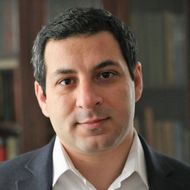
By Aram Hovsepyan
If you have ever visited the border towns in the Tavush region of Armenia, the country’s easternmost frontier with Azerbaijan, you know that one can easily tell which way is east from the bullet holes and half collapsed east-facing walls of the homes in the villages. Here you would be hard pressed to find a family that has not lost someone to the war or does not have a family member wounded or disabled by it. The memory and trauma of the war remain deeply rooted in people’s consciousness and the sporadic crossfire that continues decades on results in human and material loss in the communities of these border towns.
If you stay long enough, you can see that the constant anticipation of danger means that only the bare minimum for survival is of importance; everything else can be and is neglected. Here people are ready to share bread or shelter, not necessarily out of generosity but because that is the optimal way to survive while at war. You would also realize that in places like these, in the limbo of war but peace, emotions become unnecessary baggage and are suppressed till times are better.
For sensitive people, it is especially difficult. People can be born hypersensitive or acquire sensitivities as a result of the environment they live in. Parents striving for survival are often emotionally unresponsive towards their children, and generations of children can grow up feeling unloved, misunderstood and learn that emotions need to be hidden, locked away. This behavior is further reinforced when, as adults, they realize that emotional reservedness is encouraged not only by the family but by society as a whole.
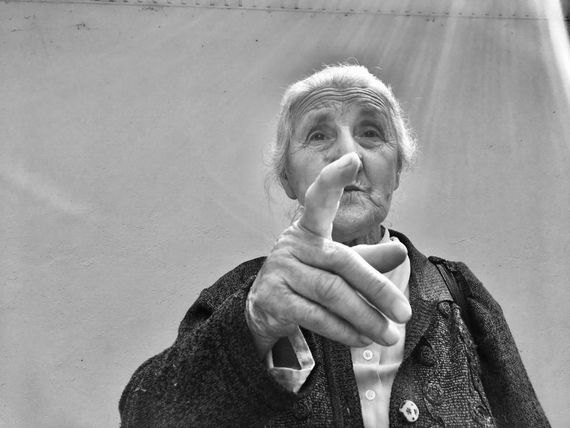
"I’ve lived for 73 years; they were spent on the border. I’ve seen everything - war, death, starvation - all kinds of suffering has passed before my eyes. But I sometimes think that all of those difficulties came to an end, they came and went but there is no end to my son’s suffering."
հայերեն
Today, the voices of people suffering from mental illness is not being heard; they have been stifled not only by society, but by those closest to them. This is a story about a mother, who, for decades has dedicated her life to taking care of her ill son. Looking into their eyes, there is a wall that over time has become impenetrable, depriving them both of any hope of returning to a life of joy or fulfillment.
I’ve lived for 73 years; they were spent on the border. I’ve seen everything - war, death, starvation - all kinds of suffering has passed before my eyes. But I sometimes think that all of those difficulties came to an end, they came and went but there is no end to my son’s suffering. It has been 30 years, it is eating him up, eating me up and there is no end in sight. It is my cross to bear till death.
The first signs of trouble with her son’s mental health started appearing 26 years ago. He has been in and out of mental health institutions, the last time he checked out of one was two months ago. Meanwhile his mother who has faced her own crippling challenges has found solace in a Christian sect.
They have told me the name of his sickness, it is schizophrenia.[1] They told me it is incurable, he will be sick for life. I’ve done all I could, I never spared myself, I’ve put aside my life and I live by his. I don’t know, if someone discovers a cure and heals him, then glory to God, if not, we will continue to live like this - he with his pain, I with mine.
There are 30-35 million people living with schizophrenia in the world, 10,000 of them live in Armenia and most of them will never be able to lead full lives. Unlike other mental health disorders in Armenia, people with schizophrenia are largely under state care and supervision. They are registered at psychiatric hospitals and receive free medical help and medication. But even this, which is a notably encourageable practice by international standards, is not enough to considerably improve their lives. Not all regions in Armenia have psychiatric clinics. Due to a lack of psychiatrists, other doctors have taken it upon themselves to care for psychiatric patients but they do not have the capacity to deal with serious cases. Also, there is a lack of specialized staff to administer the medication and monitor patients resulting in a situation that often spirals out of control. There are also plenty of misconceptions and stereotypes when it comes to mental health. For this reason, both the patient and the family need accurate information to help them deal with the situation and know what to expect.

A doctor enters the patient room in a border town clinic.
They say it is hereditary. What can I say, they are the professionals, they must know something but there has been no one with that sickness in our family. Strange people… for example my husband was a very jealous man, would become suspicious for no reason, or it would be more accurate to say that he lived in constant suspicion. I’m strange too [laughing], sure I am. What kind of a person can put her life aside and live someone else’s for these many years. I should have lost it years ago. But God showed me the light, allowed me to be present otherwise my son would be neglected (alone). My other sons were normal, they did not have any psychological issues. This one too was well behaved, quiet, modest and shy as a child. The others would run around and yell, he wouldn’t. I can tell you nothing else that was different about him. He was like everyone else, wouldn’t pick fights, wasn’t suspicious or strange.
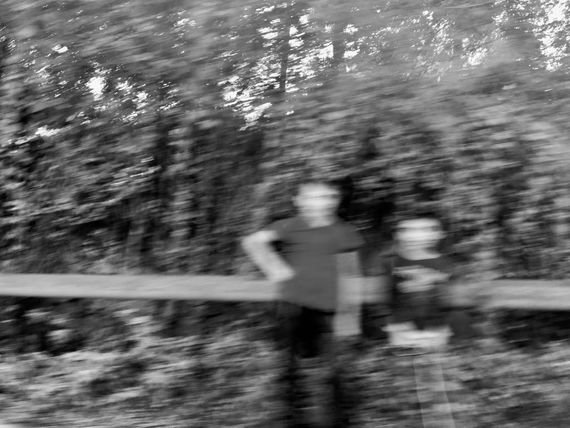
Children on the side of the road between the town of Berd and the border village of Chinari.
Schizophrenia is known as a hereditary illness but many understand it too literally, believing someone else in the family should have also had the same illness. This is not necessarily true. One can inherit the preconditions for the illness - risk factors include a certain personality trait, physiological traits that can mean the person is more vulnerable and prone to react to certain stressful situations in a certain way, for example, becoming extremely suspicious or starting to hear voices (having auditory illusions). In this case, we can assume that the father’s chronic jealousy and suspiciousness and the mother’s extreme religiousness are the hereditary traits that created the precondition. Both these traits assume a one-sided, subjective and unbalanced perception of reality, when certain aspects are given too much focus and others are pushed to the background.
He came back from the war like this. He was young, the war was raging, he had no choice but to go, everyone went. Whatever happened in Artsakh… They said there was an explosion next to him, I don't know what happened then, he got a concussion, got scared, he was wounded, the devil got inside of him? I don’t know to this day. I’m a woman, no one would tell me anything. But whatever came later, that I know.
I saw that he had lost weight, his eyes looked bigger, he lost the spark in his eyes, it was as if they were lifeless. He was either in a bad mood or normal. He did not feel like working. He would hardly talk, nothing was interesting for him. Both his father and I would reprimand him, we would say - you are a young man, don’t stay home all day long, go find something to do. He would not respond. One day he would go do something somewhere, the next day he would be back at home. I did not realize he had mental health issues until he started saying that they are after him, they are going to come get him.
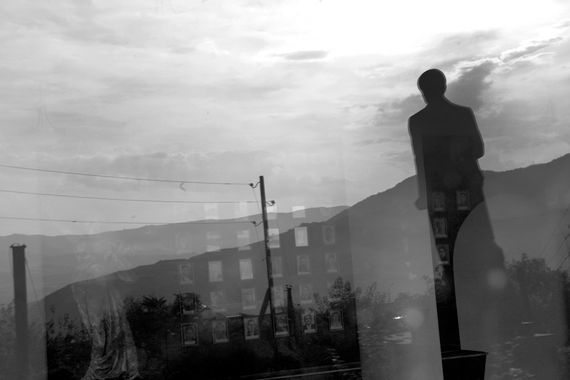
The lobby of a school where the images of all the soldiers form the village who died during the Karabakh War are reflected in the window. The statue in front is of Stepan Shahumyan, a hero of the Soviet Union.
The onset of the illness can be acute or gradual. The initial symptoms can be quite different.[2] but the feeling that something is wrong and the fear from these inexplicable changes is always present. For this reason, it is extremely important that a person is given the opportunity to share their feelings. Unfortunately, often times, this doesn’t happen. In this case, we don’t know what the trigger was for the illness to manifest - the explosion the mother talks about (though it is possible the illness began sooner), the elongated periods of high tension during military operations, the constant anticipation of danger that led to hypersensitivity. Living in a constant state of anxiety, unable to share concerns that were commonly met with either criticism or neglected because talking about feelings, emotions, concerns for health are not encouraged during war. Talking about these things at home was not possible as well, here he had to live up to an upbringing that says “real men” should be reserved, hold back and show no signs of weakness.
This is how it was for a few years. One day we had a big fight and as if something inside him exploded, he began to talk. He said they are telling him what is happening, what is right and what is wrong; the voice inside his head follows him, protects him from danger. I asked him how come we don’t hear such a voice, how come it is only him who hears it. He smiled and did not reply. Sometimes he would talk to himself, laugh. At first that scared me a lot, then I got used to it. Then he told me that the TV is telling him what to do. The next day he threw the TV out in the trash. I was to afraid to ask him why he did that because he could have turned on me and said that I had something to do with those people.
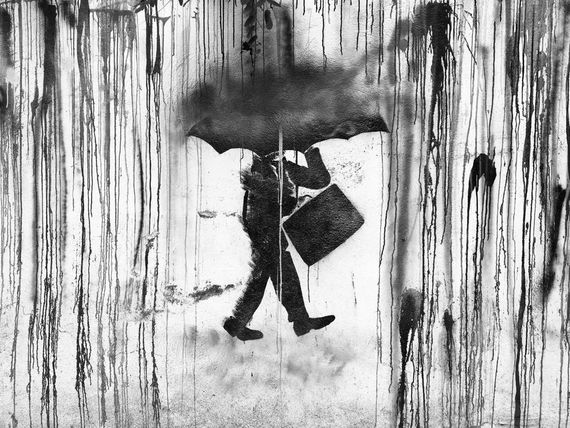
Graffiti art near a park in the town of Berd.
During auditory hallucinations, the afflicted person can hear voices that can be critical, warn or give instructions.[3] At first it scares the person but over time, he/she comes up with a rationalization of why the voice is there. Seeing that others are not able to relate to their experience, he/she no longer wants to mention the hallucinations to anyone out of fear that they will be misunderstood, discredited, seem strange and as a result they face the it alone, looking for explanations and failing to find answers. The right approach would be to be seen by a medical professional who can help the patient understand that what they are hearing are hallucinations. But that rarely happens because the right specialist is usually not consulted in time and the situation persists to a point of no return, when the patient is no longer capable of being persuaded of the opposite of what they have come to believe.
When I saw that he was turning against me, I got really scared. But to tell you the truth, at first I was more hurt than scared. I had dedicated all my life to caring for him, done everything for him and I get this in return? But he is sick and the mind of a sick person works in mysterious ways. He would insist that they were following him. Would smash his phone to pieces once a year out of conviction that it was being tapped. Once I said, “We hardly have anything, stop smashing your phone.” He accused me of being one of them. After that I would not open my mouth, would silently walk away.
It is most difficult for the people around the patient to understand the patterns that are at work when there is delusional behaviour.[4] The delusion gradually becomes more elaborate and in itself becomes the rationalization of everything else around the patient. Every detail is interpreted accordingly, through the prism of the delusion and most often the people closest to the patient (usually immediate family members) become a part of the narrative. The closer the relationship between the patient and the family member, the more caring the latter, the more suspicious and hostile the patient becomes towards them.
Then came a moment when I understood that I need to take him to the hospital, there is no other hope. What parent would want to take their child to the psychiatric ward? I didn’t either. After his first time in, he came home considerably improved. I was so full of hope, thought he might be healed, be like he was before, take care of me in old age. But after a while he stopped taking his medication. A year later he was back at the hospital, again he was better and was sent home but then again he stopped taking the medication.
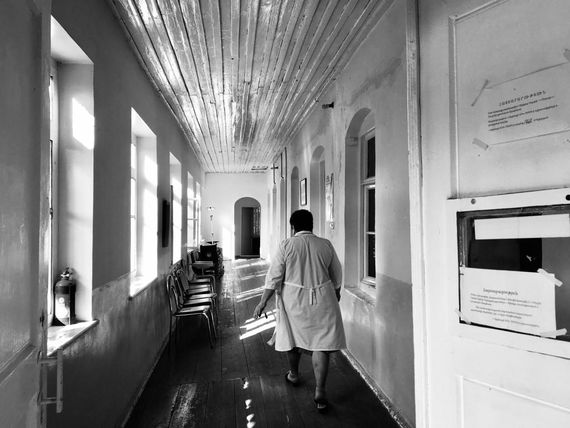
At a health clinic in one of the border villages in the Tavush region of Armenia.
Modern medicine is able to considerably alleviate the symptoms of schizophrenia. If the treatment starts soon after the onset of the symptoms and integrates the necessary approaches, it is even sometimes possible to cure the illness. Granted that the main component in controlling the symptoms are prescription drugs, [5] however, to overcome the illness a series of approaches are needed. In Armenia, the medication usually serves the purpose of calming the patient, but as soon as it gets to a point when his/her behaviour is no longer disruptive for others, the drive to continue the treatment diminishes. The caregivers, not having faith in improving the condition of their loved ones, usually apply to receive psychiatric help when the situation extremely deteriorates.
In the beginning my husband was still around, he was able to make him listen. It became harder after he passed away. My other son was already diagnosed with cancer and the other one was in Russia. Then a friend of my husband’s would help me take him to the hospital, a couple of years later, he too migrated. My son died the same year and then the other died in Russia, I never even found out what happened to him. He would get into a lot of fights, but we don’t know if he got into a fight or it was an accident. I was left all alone in an empty house. First my family was gone, then went everything else in the house was gone - some things simply wore out, the rest he smashed to pieces. That is when the real fear set in, there is no one to help us, it is just me and him. Half of my neighbors thought I was a bad mother for committing my son to a “mental asylum,” then when I brought him back home, the other half complained that he will start yelling again and disturbing them. There have been times when people helped, but nothing changed. I have only myself to rely on.
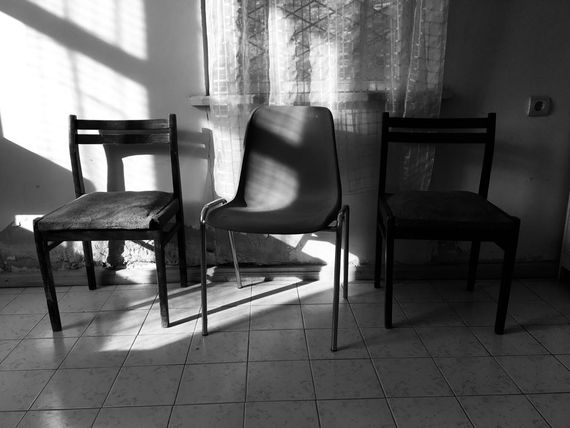
At a health clinic in one of the border villages in the Tavush region of Armenia.
The attitude of society can play a pivotal role. The family of the patient unwillingly adjust to the demands and expectations of society, becoming less and less alert to what is best for the patient. They realize that having a person with mental health issues in the family also affects how people perceive them and try to maintain the respect of others even if sometimes it goes against the best interests of the patient. This is not a very evident process but inevitably, over the years, family members of the patient find themselves paying dues to the superstitions of society and its fear of the strange, unpredictable person. While, even at the most advanced stages of the illness, the patient still has very ordinary human needs, the realization of which can considerably make his/her life better. Sometimes a simple thing like a big hug, a hearty meal or a new set of clothes can be equally therapeutic. But in reality, the caregivers themselves become less and less accommodating to the patient.
He has been in and out of the hospital. Sometimes a couple of times a year. They admit him for a month, he calms down within days and starts treating me better. Then they send him home and he refuses to take his medication, says it makes him feel bad. There is a shot that he needs once a month, it is supposed to keep him calm but that too we are not able to administer. The doctors are afraid, the nurses are afraid, they say he is dangerous, who knows what he will do. The law enforcement comes, sees that he is aggressive and does not want to deal with him either. I really don't know what to do, I’ve consulted a 100 professionals, they all say the same thing - give him his medication so that he stays calm and if it gets worse, take him to the hospital.
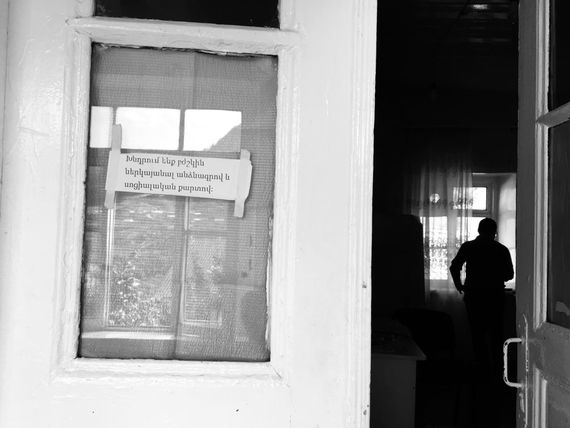
At a health clinic in one of the border villages in the Tavush region of Armenia.
For a more effective treatment, psychotherapy and social rehabilitation should accompany the medical treatment.[6] One of the main problems in Armenia is what happens to the patient after his/her release from hospital. There is outpatient care service in Yerevan, where district psychologists and psychiatrists who, even if not fully, continue to keep the patient under observation. In the regions, the patient remains without monitoring. Depending on their place of residence, they are periodically provided with free medication but there is no one to listen to them, to understand their real needs. In this case, living in a border area, so far from the capital has played its role. Naturally a person in financial need is not able to travel the distance to the capital often to get professional help.
It was late fall when he attacked me physically for the first time. I ran out of the house, went to the neighbor’s to ask for help, they refused. He came out and started shouting. I saw that the neighbors were scared as well, I made my way out of the village and spent the night in the forest. I did not care that it was cold and damp, I just hoped he would not find me. I went to the neighboring village the next day, I went to the priest. He introduced me to kind people to spend the night with. He told me to pray and all will be well. Then I found people who had a house they were not living in. They let me stay there if I needed to, they said, “It’ll be good, you’ll keep an eye on it.” Of course there is nothing in the house but when you are on the run even an empty house is something. The door does not close, I have to put a rock against it to keep it from opening from the wind. I have nothing to fear, neither me, nor anything in that house is of any interest to anyone.

View from the car on the road between Berd and the village of Chinari.
People suffering from delusions or hallucinations, constantly perceiving everything as a threat, and living in a prolonged state of tension over time, they develop feelings of animosity towards their surroundings.[7] Unfortunately, many do not understand the reasons behind the aggressive behavior or the extent of danger. In reality, much of the aggression is not directly caused by the illness but comes forth when the patient is constantly pressured into doing things he/she does not want to do. Imagine if someone came into a healthy person’s house without asking and tried to give them medication without explaining what it is for. And then, if there is resistance, the person is threatened to be administered the medicine by force, or by being taken to a place where they will keep him/her against their will and medicate anyway. And now imagine, that most patients feel they are that healthy person being tormented.
This is how we live now, half of the year I’m with him, and the other half in hiding. It’s a good thing I have my angel watching over me. I feel when he is about to get worse. I don't let it escalate, I pick up and go to the other house. I think he is even pleased. He has some friends who come over to drink together. They never show up when I’m there. They come as soon as I leave, they stay for hours, they drink and my son drinks with them. They all take advantage of my absence. I’ve asked the mailman to deliver the pension and the social assistance when I’m home, he says “These are not your checks, what do you want with them?” I can not make him understand that I’m my son’s legal guardian by a court decision and he still just delivers the checks to him when I’m not home. I don't know if he does it on purpose or just because he ignores me. My son spends it all on drinks, 1-2 days later there is nothing of it left.
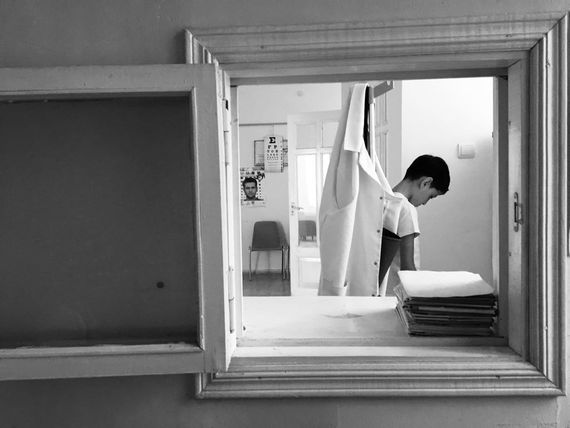
At a health clinic in one of the border villages in the Tavush region of Armenia.
Year after year, finding oneself in isolation, not having the support of others or the strength to take care of one's own needs, a person gives up on life and the ability to aspire towards something better. The despair is equally potent for the caregivers, and as a result each retreats into their own isolation and anguish.
I do not need much. I gather greens in the summer and we eat those. I’m pretty healthy, I walk a lot and I eat healthy. We make it through the winter somehow. It is cold, there is no glass in the windows of the house anymore, there is always a draft. My son and his “friends” took whatever there was to take, now they are dismantling the roof. Sometimes I give up and hang my head, and think to myself, where was I then and where am I now? But then again, I’m thankful and grateful that I am still on the face of the earth, and so is my son. God willing, we’ll still live long.
Images by Roubina Margossian.



